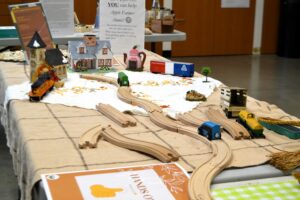Dig for Your Rights!

By Michelle Superle
Have you ever wondered about how to motivate kids to become local food champions beyond tending a school garden plot with them? I used to wonder about this, too. And once I started looking into rights-based and inquiry-driven learning, I became convinced that getting children involved in the food system will take more than learning to grow veggies—especially if we want to help them apply food sovereignty practices in their communities. It’s going to take heart and soul. Neither traditional book learning nor traditional food literacy is sufficient.
We can bring our hearts into this endeavour by considering environmental impacts of the global food system through the lens of human rights and responsibilities. We can make space for children’s souls by supporting them to develop micro-solutions they can implement on their own terms in their own community.
How does this approach to agricultural literacy work with primary grades in a green classroom? Begin by asking your students, “Do you like stories? Do you like food?” They’ll say yes. When they do, you’ll offer them a combination of picture books, discussions about children’s rights, and creative projects.
This content is restricted to subscribers only.
If you are not yet a subscriber, please consider taking out a subscription here.
If you are an existing subscriber, kindly log in or contact us at info@greenteacher.com for more information.










